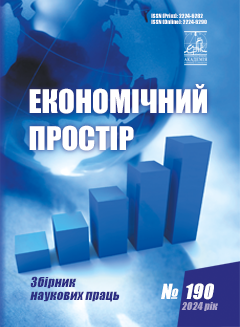THE ROLE OF SOCIAL CRITERIA IN SUSTAINABLE ECONOMIC GROWTH: SCIENTIFIC ANALYSIS AND PERSPECTIVES
Abstract
The article explores the role of social criteria in stable economic growth using the general systems theory. It focuses on studying the interaction between society and economy through the lens of the "Whole-Part" theory. The relevance of this topic lies in the fact that in the modern conditions of economic development, the importance of social criteria in stable economic growth is becoming more and more obvious. The COVID-19 pandemic has highlighted the importance of taking into account social aspects in the development of economic policies and strategies, as it has reflected the need to ensure social protection and support for all sections of the population. Also, the growth of social tensions in many countries of the world indicates the need to improve approaches to taking into account social criteria in economic development strategies. Therefore, the study of the role of these criteria is a relevant and important task for scientists and practitioners. The authors emphasize the importance of developing science, culture, and education as key social spheres in shaping an innovative economy. The study also examines modern methods of systemic analysis and modeling to better understand and forecast the relationships between social and economic processes. It highlights the potential of these methods in enhancing the management of society and the economy in the context of contemporary development. The research underscores the importance of considering the specificities of each situation when implementing social criteria to ensure economic growth. The authors stress the need for a comprehensive approach and the use of a wide range of tools for effective management of this process. Such analysis and approach could form the basis for developing strategies aimed at stabilizing economic growth and enhancing social welfare. Furthermore, the analysis emphasizes the necessity of adapting social criteria to the unique circumstances of each situation to maximize their effectiveness in driving economic growth. The comprehensive approach and diverse array of tools advocated in the study offer a robust framework for managing this complex interplay between society and the economy. By providing insights into the dynamics of social and economic interactions, this research lays the groundwork for developing strategies that promote both stable economic growth and enhanced social well-being.
References
Lukianenko, D., & Simakhova, A. (2023) Civilizational Imperative of Social Economy. Problemy Ekorozwoju, no. 18(1), pp. 129–138. DOI: https://doi.org/10.35784/pe.2023.1.13
Tkalenko, N., Mykhailovska, O., Marhasova, V., Garafonova, O., & Pishchenko, O. (2023) Environmental component of sustainable development of territorial communities. Financial and Credit Activity Problems of Theory and Practice, no. 4(51), pp. 451–465. DOI: https://doi.org/10.55643/fcaptp.4.51.2023.4059
Tepliuk, M., Polishchuk, Y., Fomenko, B., Bortnik, A., Domina, O., & Matsola, S. (2024) An entropic perspective on business relocation in the context of sustainable development. Financial and Credit Activity Problems of Theory and Practice, no. 1(54), pp. 421–439. DOI: https://doi.org/10.55643/fcaptp.1.54.2024.4248
Fischer-Kowalski, M., & Weisz, H. (2016) The Archipelago of Social Ecology and the Island of the Vienna School. In: Haberl H., Fischer-Kowalski M., Krausmann, F., Winiwarter, V. (eds) Social Ecology. Human-Environment Interactions, vol. 5. Springer, Cham. DOI: https://doi.org/10.1007/978-3-319-33326-7_16
Hans-Peter, Plag, & Shelley-Ann, Jules-Plag. (2020) A goal-based approach to the identification of essential transformation variables in support of the implementation of the 2030 agenda for sustainable development. International Journal of Digital Earth, no. 13(2), pp. 166–187. DOI: https://doi.org/10.1080/17538947.2018.15617617
Kuts N. (2020) Environmental awareness of Ukrainians and the environment. Analytical document. Available at: https://epl.org.ua/wp-content/uploads/2020/12/ekosvidomist.pdf
Lazarenko, Y., Garafonova, O., Marhasova, V., Tkalenko, N., & Grigashkina, S. (2020) Exploring Strategic Directions for the Local Innovation Ecosystem Development in the Mining Industry. E3S Web of Conferences, vol. 174. Available at: https://www.e3s-conferences.org/articles/e3sconf/pdf/2020/34/e3sconf_iims2020_02001.pdf
Mykhailovska, O. V., Gurkovskyi, V. I., & Rudenko, O. M. (2018). Analysis of practical aspects of the interaction between civil society and public governance. Scientific bulletin of Polissia, no. 2(4(12), pp. 149–157. Available at: https://nvp.stu.cn.ua/article/view/12630018
Vasylieva, O. I., & Vasylieva, N. V. (2018) Kontseptualni zasady staloho rozvytku terytorialnykh hromad. Investments: practice and experience, no. 8, pp. 74–78. Available at: http://www.investplan.com.ua/?op=1&z=6049&i=14
Kolot A., Herasymenko O. (2020) Digital transformation and new business models as determinants of formation of the economy of nontypical employment, Social and labour relations: theory and practice, no. 10(1), pp. 33–54. DOI: https://doi.org/10.21511/slrtp.10(1).2020.06
World Population Review. (n.d.). Happy Planet Index by Country. Available at: https://worldpopulationreview.com/country-rankings/happy-planet-index-by-country
Country Economy. (n.d.). World Happiness Index: Ukraine. Available at: https://countryeconomy.com/demography/world-happiness-index/ukraine



